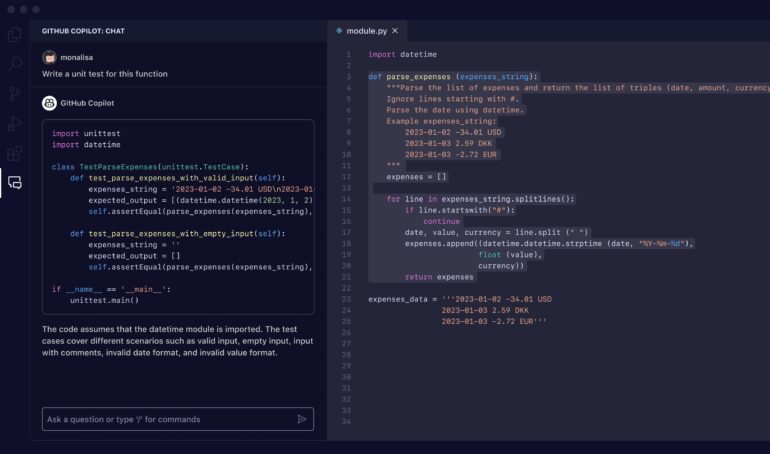TL;DR:
- GitHub’s Copilot Chat is now available to all users after a phased rollout.
- It is integrated into Microsoft’s IDEs and free for verified educators, students, and open-source maintainers.
- Copilot Chat utilizes GPT-4, a generative AI model, for real-time programming guidance.
- Concerns about copyright issues and codebase owner opt-outs are raised.
- GPT -4’s tendency to generate inaccurate information is noted, emphasizing the need for human review.
- GitHub aims to make Copilot profitable despite financial challenges.
- Amazon’s CodeWhisperer emerges as a strong competitor.
- The AI-assisted coding landscape sees increased competition from startups and open-source models.
Main AI News:
GitHub’s Copilot Chat, a programming-centric chatbot akin to ChatGPT, is now available to a broader audience. Initially introduced for business subscribers, it’s gradually made its way to individual Copilot users, even those paying the $10 monthly fee during beta testing. Today, GitHub is officially launching Copilot Chat for all users.
This innovative tool is seamlessly integrated into Microsoft’s IDEs, Visual Studio Code, and Visual Studio, and it is included as part of GitHub Copilot’s paid tiers. Moreover, it’s free for verified educators, students, and maintainers of select open source projects.
Shuyin Zhao, GitHub’s VP of product management, expressed, “As home to the world’s developers, we’ve brought to market what is now the most widely adopted AI developer tool in history. And code complete was just the beginning.”
Copilot Chat retains its foundation in GPT-4, OpenAI’s flagship generative AI model, which has been meticulously fine-tuned for development scenarios. This potent AI is capable of offering real-time guidance to developers in natural language, assisting with tasks like explaining concepts, identifying vulnerabilities, or crafting unit tests.
It’s worth noting that GPT-4, like other generative AI models, has been trained on publicly available data, some of which is subject to copyright or restrictive licenses. While GitHub and others argue that fair use doctrine shields them from copyright claims, there have been class action lawsuits alleging open source licensing and intellectual property violations against GitHub, Microsoft (GitHub’s parent company), and OpenAI.
When queried about the possibility of codebase owners opting out of this training, Zhao mentioned that there is no new mechanism for doing so with the broader launch of Copilot Chat. Instead, she recommended that codebase owners make their repositories private to prevent inclusion in future training datasets. However, this suggestion may not sit well with codebase owners who have various reasons for keeping their copyrighted code public.
One challenge with generative AI models, including GPT-4, is their tendency to generate inaccurate information or “hallucinate.” This can be particularly problematic in coding, as a recent Stanford study revealed that developers using AI assistants may produce less secure code due to these assistants introducing faulty or deprecated code snippets.
Zhao highlighted that GPT-4 performs “better” than its predecessor in mitigating hallucinations. Copilot Chat includes filters for insecure code patterns, alerting users to vulnerabilities such as hardcoded credentials, SQL injections, and path injections. Nevertheless, she emphasized the importance of human review when considering AI-suggested code.
GitHub Copilot is built on OpenAI’s models, which GitHub considers the best fit for their current services. Zhao expressed confidence in their ability to empower developers with AI tools that facilitate the creation of better and more secure software at scale.
In October, Microsoft CEO Satya Nadella disclosed that Copilot had garnered 1 million paying users and approximately 37,000 enterprise clients. Yet, GitHub faces the challenge of making Copilot more attractive to users and financially sustainable. The service reportedly incurs an average monthly loss of $20 per user, with some customers costing GitHub as much as $80 per month. This financial strain is attributed to the high operating costs associated with AI models, a challenge also faced by GenAI coding startup Kite, which closed down in December last year.
As GitHub strives to make Copilot a profitable venture, Amazon has been enhancing CodeWhisperer, one of Copilot’s well-resourced competitors. In April, Amazon made CodeWhisperer free for developers without usage restrictions, subsequently introducing a Professional Tier with AWS Identity and Access Management integration and extended scanning capabilities for security vulnerabilities. An enterprise plan followed in September, and in November, CodeWhisperer was optimized to provide enhanced suggestions for MongoDB app development.
Beyond CodeWhisperer, Copilot contends with competition from startups like Magic, Tabnine, Codegen, and Laredo, as well as open source models such as Meta’s Code Llama and Hugging Face’s and ServiceNow’s StarCoder. The AI-assisted coding landscape continues to evolve, offering developers a wealth of options to enhance their productivity and software quality.
Conclusion:
GitHub’s expansion of Copilot Chat to a wider audience reflects its commitment to empowering developers with AI tools. However, the challenges of copyright concerns, codebase owner opt-outs, and addressing inaccuracies in generated code must be carefully navigated. With Amazon’s CodeWhisperer and other competitors on the rise, the market for AI-assisted coding tools is becoming increasingly competitive, prompting innovation and improvements in the space.

